Best Samoyed Dog Bed
Make Your Samoyed Comfortable with An Orthopedic Bed!
Introduction
Best Samoyed dog bed takes into account their health conditions, sleeping style and preferences. Because of health reasons, an orthopedic bed is best.
Samoyeds, with their fluffy white coats and friendly “Sammy smile,” are a beloved breed known for their affectionate nature, intelligence, and high energy. Originally bred by the Samoyedic people of Siberia to herd reindeer and pull sleds, these dogs are not only beautiful but also hardworking and loyal.
Their playful personality makes them excellent family companions, especially for those who can provide the attention and exercise they crave. However, owning a Samoyed comes with specific responsibilities.
Their thick double coat requires regular grooming, and their independent nature can make training a bit challenging. Moreover, their high energy levels mean they need plenty of physical and mental stimulation to avoid boredom, which can lead to destructive behaviors.
For those ready to welcome a Samoyed into their home, understanding the breed’s unique characteristics, potential health issues, and specific care requirements is essential.
This guide will provide new Samoyed owners with the information they need to raise a happy, healthy, and well-behaved dog. The topics include best bed types, best brands, facts, fun facts, health conditions, behavior concerns, tips for new owners, costs of ownership, safe foods and foods to avoid.
Video: Pros and Cons
A great video sharing the pros and cons of Samoyed ownership.
Best Dog Bed Types
Here’s a list of dog bed types you can recommend to new Samoyed owners, keeping in mind the breed’s size, shedding, and comfort needs:
1. Orthopedic Dog Beds
- Description: Made with memory foam or supportive materials, these beds provide extra cushioning for dogs with joint issues, which can be beneficial for Samoyeds prone to hip dysplasia or arthritis.
- Best For: Older Samoyeds or those with health concerns.
- Recommendation: Look for a bed with high-density foam and removable covers for easy washing.
2. Bolster Dog Beds
- Description: These beds have raised sides (bolsters) around the edges, providing a sense of security and a place for dogs to rest their heads.
- Best For: Samoyeds who like to curl up or lean against something while they sleep.
- Recommendation: Choose a bed with bolsters that have firm support but are soft enough for comfort.
3. Cooling Dog Beds
- Description: Made with breathable, cooling materials, or gel inserts, these beds help regulate temperature, which is great for Samoyeds with their thick coats who can overheat in warmer climates.
- Best For: Warm weather or summer months.
- Recommendation: A raised mesh bed or a gel-infused cooling mat that’s easy to clean.
4. Elevated Dog Beds (Cot-Style)
- Description: These beds are raised off the ground, providing better airflow and keeping dogs cooler and away from dirt or debris. They are easy to clean and great for outdoor use.
- Best For: Outdoor use or for Samoyeds who enjoy staying cool.
- Recommendation: Opt for one with a durable frame and breathable fabric, especially for summer months.
5. Donut/Calming Dog Beds
- Description: These beds have a circular, plush design with raised edges, giving a cozy and comforting environment that can help relieve anxiety.
- Best For: Samoyeds who enjoy burrowing or nesting.
- Recommendation: Ensure it’s large enough to fit their size comfortably and choose one with machine-washable materials.
6. Waterproof or Water-Resistant Dog Beds
- Description: Designed with waterproof liners or water-resistant materials, these beds help protect against accidents, spills, or moisture from outdoor activity.
- Best For: Puppies, senior dogs, or dogs that spend time outdoors.
- Recommendation: Look for one with a durable, removable cover that can be washed easily.
7. Chew-Resistant Dog Beds
- Description: Made from tough, durable materials to resist chewing, these beds are designed for dogs who tend to be destructive with their bedding.
- Best For: Samoyed puppies or dogs who like to chew on their bedding.
- Recommendation: Consider reinforced stitching and sturdy fabrics like ballistic nylon or canvas.
8. Memory Foam Dog Beds
- Description: These beds conform to a dog’s body, offering orthopedic support, ideal for large breeds like Samoyeds. They’re great for dogs with joint pain or who need extra cushioning.
- Best For: Senior Samoyeds or dogs with joint or back issues.
- Recommendation: Choose high-quality memory foam and a cover that’s easy to clean.
9. Heated Dog Beds
- Description: Designed to provide warmth, these beds can be plugged in or heated naturally to keep dogs warm during cold weather.
- Best For: Cold climates or winter months.
- Recommendation: Ensure the bed has safety features and is used in colder months, particularly for Samoyeds who love warmth despite their thick coat.
10. Crate Mats
- Description: These are thinner, cushioned pads that fit inside dog crates, providing comfort without taking up too much space.
- Best For: Samoyeds who are crate-trained and need a cozy spot in their crate.
- Recommendation: Look for a durable, washable crate mat with extra padding for comfort.
Additional Tips:
- Size Matters: Samoyeds are medium to large dogs, so recommend beds that are large enough to accommodate their size comfortably.
- Durability: Given their activity level and size, suggest beds made from high-quality, durable materials to withstand wear and tear.
- Washability: Because of their shedding, recommend beds with removable, washable covers to help maintain cleanliness.
- CertiPU-RUS Seal: When shopping for a memory foam bed be sure to look for the CertiPUR-US seal. The seal means the materials used do not contain any toxins or chemicals that are harmful to humans and pets.
These options will give Samoyed owners plenty of choices depending on their dog’s preferences and needs!
Best Brands
Here’s a list of some of the best dog bed brands you can recommend to new Samoyed owners, known for their quality, comfort, and durability:
1. Big Barker
- Best For: Large dogs, including Samoyeds.
- Why Recommend: Big Barker beds are designed specifically for larger breeds and offer orthopedic support, which is excellent for Samoyeds who may experience joint issues like hip dysplasia. Their beds are made from high-density foam that won’t flatten over time.
- Popular Option: Big Barker 7-inch Pillow Top Orthopedic Dog Bed.
2. PetFusion
- Best For: Orthopedic support and durability.
- Why Recommend: PetFusion beds are made with memory foam, offering orthopedic benefits and great comfort. Their beds are also durable, have water-resistant covers, and are easy to clean, which is ideal for active dogs like Samoyeds.
- Popular Option: PetFusion Ultimate Dog Bed.
3. Furhaven
- Best For: Variety of styles and affordability.
- Why Recommend: Furhaven offers a wide range of bed styles, including orthopedic, cooling gel, and plush designs, giving owners options based on their dog’s specific needs. The beds are also budget-friendly and come in various sizes to fit a Samoyed comfortably.
- Popular Option: Furhaven Orthopedic, Cooling Gel, and Memory Foam Pet Bed.
4. K&H Pet Products
- Best For: Heated and cooling beds.
- Why Recommend: K&H Pet Products specialize in heated and cooling beds, making them great for both colder climates (heated beds) and warmer environments (cooling beds), ensuring Samoyeds stay comfortable in different seasons.
- Popular Option: K&H Original Pet Cot or K&H Lectro-Soft Outdoor Heated Bed.
5. BarksBar
- Best For: Orthopedic beds with bolster support.
- Why Recommend: BarksBar is known for its orthopedic dog beds with bolster sides, which provide comfort and support for dogs who like to lean or rest their heads while they sleep. Their beds are designed to relieve pressure points and are ideal for Samoyeds who need extra joint support.
- Popular Option: BarksBar Gray Orthopedic Dog Bed.
6. Majestic Pet
- Best For: Durability and indoor/outdoor use.
- Why Recommend: Majestic Pet beds are made from durable materials, making them suitable for both indoor and outdoor use. These beds are great for active dogs like Samoyeds and are available in a variety of sizes and styles.
- Popular Option: Majestic Pet Bagel Dog Bed.
7. Brindle
- Best For: Affordability and orthopedic memory foam.
- Why Recommend: Brindle offers budget-friendly memory foam beds that provide orthopedic support. These beds are great for Samoyeds that need extra cushioning, especially older dogs or those with joint problems.
- Popular Option: Brindle Soft Shredded Memory Foam Dog Bed.
8. The Dog’s Bed
- Best For: Orthopedic support and water-resistant features.
- Why Recommend: This brand focuses on providing orthopedic beds that support healthy joints, making them ideal for Samoyeds prone to joint issues. Their beds often come with waterproof covers, protecting the mattress from spills or accidents.
- Popular Option: The Dog’s Bed Orthopedic Dog Bed.
9. Kuranda
- Best For: Elevated, chew-proof beds.
- Why Recommend: Kuranda is known for its elevated, chew-proof dog beds, which are excellent for active and strong dogs like Samoyeds. These beds are easy to clean and perfect for keeping dogs cool during warmer months.
- Popular Option: Kuranda Elevated Dog Bed.
10. Casper
- Best For: High-end, durable memory foam beds.
- Why Recommend: Casper, the mattress brand, also offers premium dog beds made from high-quality memory foam. These beds are designed to provide comfort and support, and the durable materials ensure they last a long time, even with heavy use.
- Popular Option: Casper Memory Foam Dog Bed.
Additional Recommendations:
- Laifug: Known for orthopedic memory foam beds with headrests, which are great for dogs that like to lounge.
- Orvis: Offers high-end, durable dog beds with memory foam options, along with personalized covers and bolster designs.
- MidWest Homes for Pets: Provides affordable, plush crate mats and beds that are perfect for crate-trained Samoyeds.
These brands offer a range of options to suit different budgets and needs, ensuring new Samoyed owners can find a bed that provides the comfort, support, and durability their dog needs.
Facts and Fun Facts
Here’s a list of facts and fun facts about Samoyeds that new owners and enthusiasts will enjoy:
Measurements:
- Size: Medium – Large
- Group: Working Group
- Height Male: 21 – 23.5 inches
- Height Female: 19 – 21 inches
- Weight Male: 45 – 65 lbs.
- Weight Female: 35 – 50 lbs.
- Length: 20 – 23 inches
- Fully Grown: 18 – 24 months
- Lifespan: 12 – 14 years
- Colors: White, Biscuit, Cream, White & Biscuit
- Popularity: This breed is the 50th most popular in the United States according to the American Kennel Club in 2023.
Intelligence: This breed is ranked as the 33rd most intelligent according to Professor Stanley Coren at the University of British Columbia.
Facts about Samoyeds:
- Origin: Samoyeds originated in Siberia, where they were bred by the Samoyedic people to herd reindeer, pull sleds, and keep their owners warm.
- Coat: They have a thick double coat that helps insulate them from the cold, making them ideal for colder climates. Their outer coat is coarse, while the undercoat is soft and dense.
- Temperament: They are known for being friendly, gentle, and sociable. They love being around people and typically get along well with children and other pets.
- Energy Levels: Samoyeds are highly energetic and need regular exercise to stay healthy and happy. They enjoy long walks, running, and interactive play.
- Health Issues: Common health problems in Samoyeds include hip dysplasia, progressive retinal atrophy (PRA), hypothyroidism, and diabetes.
- Barking: They are a vocal breed, often barking or “talking” to communicate, which may require some training to manage.
- Training: Samoyeds are intelligent but can be stubborn, making consistent, positive reinforcement-based training essential.
- Shedding: Samoyeds “blow” their coat twice a year, during which they shed heavily and require frequent grooming.
- The Samoyed Has a Long History: As the last Ice Age disappeared, wild reindeer became the key source of food for people living across northern Eurasia. The Nenets people, a group of people that speaks a Samoyedic language, survived by herding and breeding domestic reindeer on the Russian tundra. Their working partners were multi-purpose dogs named for the people they worked with for centuries.
- Samoyeds “Blow” (or Shed) the Undercoat Twice a Year: There is no such thing as a fully hypoallergenic dog breed. Most of those breeds considered best for allergy sufferers are non-shedding breeds. People with allergies interested in acquiring a Samoyed would do well to expose themselves to Samoyeds before deciding to purchase one. They do indeed shed.
- Samoyeds Do Well When Given Tasks to Complete: It takes an owner talented in training to bring out the best in these smart dogs who get bored easily. They have achieved MACH titles in agility, high in trial obedience awards, have bested traditional herding breeds in herding trials, and are crowd-pleasing favorites in appearances pulling Santa’s sleigh, weight-pulling, or posing for photo-ops whenever out in public. They also excel at Lure Coursing and make exceptional therapy dogs.
Fun Facts about Samoyeds:
- Sammy Smile: The Samoyed is famous for its characteristic “Sammy smile,” a unique upturned mouth that not only looks happy but helps prevent drooling and frostbite in cold weather.
- Sledding History: Samoyeds were one of the first dog breeds used in polar expeditions due to their strength and endurance. They helped explorers like Roald Amundsen and Fridtjof Nansen.
- Therapeutic Fur: Their thick undercoat is so soft that it’s often spun into wool to make warm, hypoallergenic clothing. Some owners collect their Samoyed’s shed fur and turn it into scarves or mittens!
- Great with Kids: Samoyeds are known for being excellent with children, often called “nanny dogs” for their gentle and protective nature.
- Siberian Guardians: In Siberia, Samoyeds not only helped with herding and pulling sleds, but they also slept with their owners to keep them warm in the frigid conditions.
- High-Altitude Explorers: Samoyeds have accompanied expeditions to the Arctic and Antarctic, being among the first to explore these cold, remote areas.
- All-Weather Adaptability: While Samoyeds thrive in cold weather due to their coat, they can adapt to warmer climates as long as they’re provided shade, water, and proper care to avoid overheating.
- Cuddle Buddies: Historically, Samoyeds were so valued by the Samoyedic people that they were often treated as part of the family, even sleeping in the same tents to provide warmth during cold nights.
- Curious and Mischievous: Samoyeds are playful and curious by nature, often known to open doors, dig holes, or find clever ways to entertain themselves.
- Celebrity Fans: Samoyeds have a history of being beloved by royalty, including Queen Alexandra of England, who was known to adore the breed in the early 1900s.
- Their Coats Are Relatively Easy to Clean: Once the mud is rinsed off and the dogs are dried, Samoyeds with proper stand-off coats are said to be “Teflon” dogs because the dirt doesn’t stick. A forced air driver works wonders in blowing out dirt and dust from Samoyed coats.
Health Conditions
Samoyeds are generally healthy, but like many breeds, they can be prone to certain hereditary and health conditions. Here are some of the most common health concerns associated with Samoyeds:
- Hip Dysplasia: This is a genetic condition where the hip joint doesn’t develop properly, which can lead to arthritis and mobility issues.
- Progressive Retinal Atrophy (PRA): An eye disorder that leads to the degeneration of the retina, eventually causing blindness.
- Glaucoma: A condition that affects the eyes, leading to increased pressure, which can result in vision loss if untreated.
- Hypothyroidism: A condition where the thyroid gland does not produce enough hormones, leading to lethargy, weight gain, and skin problems.
- Diabetes Mellitus: Samoyeds can be more prone to developing diabetes, where the body cannot properly regulate blood sugar levels.
- Subvalvular Aortic Stenosis: This is a heart condition where there’s a narrowing of the aortic valve, affecting blood flow.
- Pulmonary Stenosis: Another heart condition involving the narrowing of the pulmonary valve, which can strain the heart.
- Renal Dysplasia: A congenital condition affecting the development of the kidneys.
- Samoyed Hereditary Glomerulopathy: This is a kidney disease specific to Samoyeds, which can lead to kidney failure.
- Patellar Luxation: A condition where the kneecap dislocates, which can cause pain and limping.
Regular veterinary check-ups, a healthy diet, and proper exercise can help manage or prevent many of these conditions.
Behavior concerns
Samoyeds are known for their friendly, energetic, and intelligent nature, but they also have some breed-specific behaviors that potential owners should be aware of. Here’s a list of common Samoyed behaviors that you can share with new owners:
- Friendly and Social
- Samoyeds are typically very friendly and love human companionship. They are not suited to being left alone for long periods, as they may develop separation anxiety.
- Affectionate and Loyal
- They form strong bonds with their families and tend to be very affectionate. Samoyeds are known for their “Sammy smile,” a happy and friendly expression.
- High Energy Levels
- Samoyeds are a working breed, originally bred for herding and sledding. They have high energy levels and require a lot of exercise, including long walks and play sessions to keep them happy and healthy.
- Stubbornness
- They are intelligent but can be quite stubborn, which may make training a challenge. Consistent, positive reinforcement training works best for this breed.
- Playful and Good with Kids
- Samoyeds are playful and often great with children, making them good family pets. They enjoy interactive games, such as fetch or tug-of-war.
- Vocal and Talkative
- This breed tends to be quite vocal. They may bark or “talk” to express their emotions, whether it’s excitement, frustration, or simply a desire for attention.
- Prone to Herding
- Like many working dogs, Samoyeds may exhibit herding behavior, which can involve nudging or corralling people or other animals.
- Independent Thinkers
- While they are loyal, Samoyeds can be quite independent and may prefer to do things on their own terms, which sometimes makes them less obedient compared to other breeds.
- Curious and Adventurous
- Samoyeds love exploring their environment. They are curious and may wander off if not kept in a secure area or properly supervised.
- Digging
- They have a natural instinct to dig, which comes from their background as sled dogs. Samoyeds would dig holes to create shelter from the cold, and this behavior can persist even as house pets.
- Prey Drive
- Samoyeds may have a higher prey drive and might chase smaller animals like squirrels, rabbits, or cats. Early training can help manage this behavior.
- Grooming and Shedding
- Samoyeds are known for their thick, fluffy coats, which require regular grooming. They shed a lot, especially during seasonal changes, so new owners need to be prepared for regular brushing.
- Sensitive to Emotions
- Samoyeds are highly attuned to their owners’ emotions and can be very empathetic. They often respond to changes in mood or energy level.
By understanding these behaviors, new Samoyed owners can better prepare for the joys and challenges that come with raising this lovable and spirited breed!
Tips for New Owners
Here’s a list of helpful tips for new Samoyed owners to ensure they provide the best care and environment for their dog:
- Start Training Early
- Samoyeds are intelligent but can be stubborn, so early training is key. Use positive reinforcement methods, such as treats and praise, and stay consistent with commands. Start with basic obedience training and socialization to help them develop into well-behaved adults.
- Provide Regular Exercise
- Samoyeds are a high-energy breed that requires daily exercise to stay happy and healthy. Plan for long walks, playtime, and opportunities for them to run. Mental stimulation, like puzzle toys and interactive games, will also help keep them engaged.
- Invest in a Good Grooming Routine
- Samoyeds have a thick double coat that requires regular brushing to prevent matting and reduce shedding. Brush them at least a few times a week, and more frequently during shedding seasons (spring and fall). Bathing should be done as needed, but not too frequently, as it can strip their coat of natural oils.
- Socialize Early and Often
- Introduce your Samoyed to a variety of people, dogs, and environments early on. Proper socialization will help reduce the chances of them developing fear or aggression towards new situations and make them more adaptable.
- Be Patient with Their Independence
- Samoyeds can be independent thinkers, which sometimes means they won’t always follow commands right away. Patience and consistency are key in training and managing their independent nature.
- Provide a Secure Space
- Because Samoyeds are naturally curious and adventurous, make sure your yard is securely fenced. They can be escape artists and may wander off if they find an opening. Supervise them when outside, especially in areas without a fence.
- Manage Their Prey Drive
- Samoyeds may have a strong prey drive, especially around small animals like squirrels or cats. Work on recall commands early, and always keep them on a leash during walks in areas where small animals are common.
- Use Crate Training
- Crate training can help with housebreaking, give them a safe place to relax, and prevent destructive behavior when you’re not home. Make the crate a positive space with toys and treats.
- Monitor Their Diet
- Samoyeds can be prone to obesity, so make sure to feed them a balanced, high-quality diet. Monitor their weight and adjust portions as necessary, especially if they are getting less exercise. Avoid giving them too many treats or human food.
- Keep Them Mentally Stimulated
- In addition to physical exercise, Samoyeds need mental stimulation. Engage them with puzzle toys, training sessions, or tasks that challenge their intelligence to prevent boredom.
- Prevent Separation Anxiety
- Since Samoyeds thrive on human companionship, they can suffer from separation anxiety. Gradually get them used to being alone by leaving them for short periods at first, and provide toys or chews to keep them occupied.
- Plan for Seasonal Grooming
- Samoyeds “blow” their coat twice a year, during which they shed a large amount of fur. Be prepared with extra grooming sessions during these times to manage the shedding and avoid fur covering your home.
- Monitor Their Health Regularly
- Keep an eye out for common health issues like hip dysplasia, eye conditions, and hypothyroidism. Regular vet check-ups are important to catch any potential problems early.
- Be Mindful of Heat
- Samoyeds are bred for cold climates, so they can overheat easily in warm weather. Avoid intense exercise in hot conditions, and always provide access to shade and fresh water. Consider early morning or evening walks when it’s cooler.
- Provide Chew Toys
- Samoyeds like to chew, especially as puppies. Provide durable chew toys to satisfy this instinct and prevent them from chewing on furniture or other household items.
- Maintain Good Dental Health
- Regular brushing of their teeth can help prevent dental issues. Use a dog-friendly toothbrush and toothpaste, and provide dental chews or toys to support their oral health.
- Join a Samoyed Community
- Consider joining a Samoyed club or online community. These groups can provide valuable advice, support, and opportunities to meet other Samoyed owners, which can be helpful for new owners.
Costs of Ownership
Here’s a breakdown of the average costs associated with owning a Samoyed, which will help new owners plan their budget:
- Initial Purchase or Adoption Cost
- Breeder: $1,500 – $3,500 The price varies depending on the breeder’s reputation, the dog’s lineage, and location.
- Adoption: $100 – $500 Adopting from a shelter or rescue is often more affordable and includes some initial medical care.
- Initial Supplies (One-Time Costs)
- Crate: $50 – $150 A large crate suitable for a full-grown Samoyed is necessary for training and providing a safe space.
- Leash, Collar, and ID Tag: $30 – $60 Durable equipment is needed for daily walks and identification.
- Food and Water Bowls: $10 – $30 Stainless steel or ceramic bowls are recommended.
- Toys: $20 – $50 Samoyeds are active and need plenty of toys for mental stimulation and play.
- Grooming Supplies: $40 – $100 Brushes, combs, nail clippers, and shampoo are essentials for this breed’s high-maintenance coat.
- Bed: $40 – $100 A comfortable, durable bed that can withstand shedding and wear is important.
- Puppy Training Classes (Optional): $100 – $300 Early training is key for Samoyeds, and group classes can be a good option for socialization.
- Food (Ongoing)
- Dog Food: $40 – $80 per month High-quality dry dog food is recommended, and the cost depends on the brand and the dog’s size.
- Treats: $10 – $20 per month Healthy treats are useful for training and rewards.
- Veterinary Care (Ongoing)
- Routine Check-ups: $200 – $400 per year Annual check-ups, vaccinations, and preventive care, like flea and tick prevention.
- Spaying/Neutering: $200 – $500 (one-time cost) This cost depends on your location and the vet.
- Dental Care: $100 – $300 per year Regular dental check-ups and cleanings help prevent dental disease.
- Pet Insurance: $30 – $70 per month Insurance can help cover the cost of emergencies or long-term health conditions.
- Medications and Preventatives: $100 – $300 per year This includes flea, tick, and heartworm preventatives.
- Grooming (Ongoing)
- Professional Grooming: $60 – $120 per session, 3-4 times a year While you can groom them at home, many owners opt for professional grooming to maintain their Samoyed’s thick coat.
- Training and Behavior (Ongoing)
- Training Classes or Private Trainers: $150 – $500 per year Professional training may be necessary, especially for a stubborn or independent Samoyed.
- Miscellaneous
- Dog Walking or Pet Sitting: $15 – $30 per walk or $20 – $50 per day for sitting If you work long hours or travel frequently, this can be an important expense.
- Boarding: $30 – $60 per day When traveling, boarding your Samoyed can add up quickly.
- Unexpected Medical Costs
- Emergency Vet Visits: $500 – $2,000 or more It’s always wise to budget for potential emergencies or chronic health issues, especially since Samoyeds can be prone to certain hereditary conditions.
- Pet Insurance (Optional)
- Monthly Premium: $30 – $70 Pet insurance can help offset costs in case of accidents, illnesses, or hereditary conditions.
- Ongoing Maintenance
- Replacement of Supplies: $50 – $100 per year Leashes, collars, toys, and beds may wear out and need replacing over time.
- Additional Cleaning Supplies: $10 – $30 per month Due to their shedding, you’ll likely spend more on cleaning tools like lint rollers, vacuum cleaners, and pet-safe cleaners.
Estimated Annual Cost:
- First Year: $2,000 – $4,500 This includes the initial cost of supplies, puppy vaccines, spaying/neutering, and training.
- Subsequent Years: $1,500 – $3,000 This includes food, grooming, routine veterinary care, and other ongoing expenses.
Planning for these costs will help ensure that new Samoyed owners are prepared for both the expected and unexpected financial responsibilities that come with owning this wonderful breed!
Safe Foods and Foods to Avoid
Here’s a list of safe foods and foods to avoid for Samoyeds (and dogs in general). These lists are helpful to new owners to ensure they provide safe, healthy options for their dog.
Safe Foods for Samoyeds
These foods can be given in moderation and are generally healthy for dogs:
- Lean Meats (chicken, turkey, beef, lamb, and pork)
- Cooked and unseasoned; avoid bones and fatty cuts.
- Fish (salmon, sardines, mackerel)
- Cooked, boneless, and rich in omega-3 fatty acids, which are good for their skin and coat.
- Eggs
- Cooked eggs are a great source of protein and can be given occasionally.
- Carrots
- Raw or cooked, carrots are a good source of vitamins and fiber.
- Pumpkin
- Plain, cooked pumpkin can help with digestion and is a good source of fiber.
- Sweet Potatoes
- Cooked and plain, sweet potatoes are high in vitamins and fiber.
- Green Beans
- Cooked or raw, green beans are a low-calorie treat that provides vitamins and fiber.
- Apples
- Sliced apples (without seeds or core) are a crunchy, healthy snack with fiber and vitamins A and C.
- Blueberries
- A great antioxidant-rich treat, blueberries are good for your dog’s overall health.
- Peanut Butter (unsalted, no added sugar or xylitol)
- A tasty treat, peanut butter is packed with healthy fats and protein.
- Plain Yogurt
- Unsweetened, plain yogurt can be a good source of probiotics and calcium.
- Rice and Oatmeal
- Plain, cooked rice and oatmeal are gentle on the stomach and good for digestion.
- Cucumbers
- Low in calories and high in hydration, cucumbers are a refreshing snack.
Foods to Avoid with Samoyeds
Certain foods are toxic or harmful to dogs and should never be given to Samoyeds or any dogs:
- Chocolate
- Contains theobromine, which is toxic to dogs and can cause heart issues, vomiting, and seizures.
- Grapes and Raisins
- Highly toxic to dogs, these can cause kidney failure even in small amounts.
- Onions and Garlic
- Both can damage a dog’s red blood cells and lead to anemia. This includes powdered, raw, and cooked forms.
- Avocado
- Contains persin, which can cause vomiting and diarrhea in dogs. The pit is also a choking hazard.
- Alcohol
- Even small amounts can cause dangerous effects in dogs, including vomiting, diarrhea, decreased coordination, and even respiratory failure.
- Caffeine
- Found in coffee, tea, and energy drinks, caffeine is toxic to dogs and can lead to hyperactivity, increased heart rate, and seizures.
- Macadamia Nuts
- Highly toxic to dogs and can cause vomiting, tremors, and hyperthermia.
- Xylitol (artificial sweetener)
- Found in sugar-free gum, candy, and some peanut butters, xylitol can cause a dangerous drop in blood sugar and liver failure in dogs.
- Raw Meat and Fish
- Can contain harmful bacteria like salmonella or parasites, so it’s safer to cook them.
- Raw Eggs
- While some feed their dogs raw eggs, there’s a risk of salmonella, so cooked eggs are a safer option.
- Bones (especially cooked bones)
- Cooked bones can splinter and cause internal injuries. Stick to raw bones or bone-safe chews.
- Dairy Products (in excess)
- While some dogs tolerate small amounts of dairy, too much can cause digestive upset due to lactose intolerance.
- Fatty Foods and Fried Foods
- High-fat foods can lead to pancreatitis in dogs. Avoid giving them fatty cuts of meat, bacon, and greasy snacks.
- Yeast Dough
- Raw dough can expand in a dog’s stomach, causing painful bloating and potential life-threatening issues.
- Spicy Foods
- Spices can upset your dog’s stomach and cause excessive thirst, vomiting, or diarrhea.
- Salt and Salty Foods
- Too much salt can cause sodium ion poisoning, which can lead to vomiting, diarrhea, tremors, and seizures.
General Guidelines:
- Moderation is key: Even safe foods should be given in moderation to prevent stomach upset or weight gain.
- Always check for toxic ingredients in any human food before giving it to your dog.
- Consult your vet if you’re unsure about a specific food or if your Samoyed shows signs of illness after eating something new.
Conclusion
Welcoming a Samoyed into your family can be an incredibly rewarding experience, as these dogs are known for their affectionate, playful, and loyal personalities.
However, they require a significant commitment in terms of time, care, and financial resources. From their high grooming needs due to their thick coats, to their demand for daily exercise and mental stimulation, Samoyeds thrive in homes where they receive plenty of attention.
Early training and socialization are crucial for managing their independent and sometimes stubborn nature, and owners should be prepared for regular vet visits to monitor for common health issues like hip dysplasia and eye conditions.
Additionally, budgeting for the costs of food, grooming, vet care, and training will help ensure that you are prepared to meet the ongoing needs of this wonderful breed. Understanding which foods are safe for them, along with foods to avoid, will further help in maintaining their health and well-being.
While owning a Samoyed can be a demanding task, the reward is a lifelong bond with a loyal and loving companion. For those who are up to the challenge, Samoyeds bring joy, energy, and plenty of love into the lives of their owners, making every effort well worth it.
With the right care, your Samoyed will be a happy, healthy, and cherished member of your family for years to come.
You can check out the other dog breed information by clicking HERE!
Shop Dog Beds
Shop dog beds for your dog by selecting or clicking on any bed of choice. You will be taken to Amazon where you can read customer reviews and answered questions and place the order.
As an Amazon Associate, I earn from qualifying purchases. Your purchase price is the same as if you shop directly on Amazon.
The price at time of publish is included below to give you an idea of what the price is; however, it is subject to change.
Shop Rectangle Dog Beds
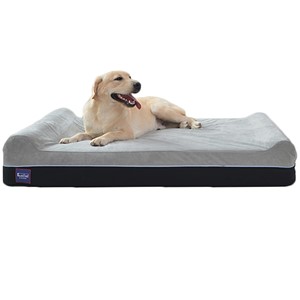
Laifug Large Grey Orthopedic Rectangle Bed
Price At Time of Publish $130.00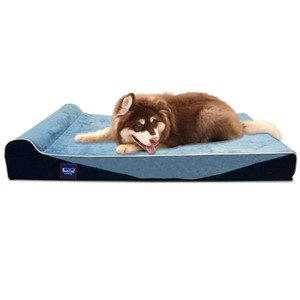
Laifug Large Blue Orthopedic Rectangle Bed
Price At Time of Publish $130.00 $110.00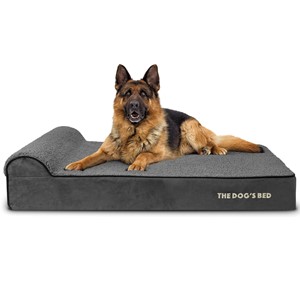
The Dogs Bed XL Grey Orthopedic Rectangle Bed
Price At Time of Publish $130.00 $185.00
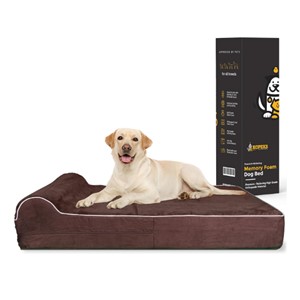
KOPEKS Jumbo Orthopedic Rectangular Bed
Price At Time of Publish $130.00 $110.00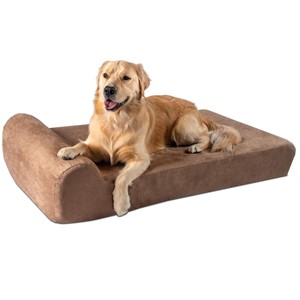
Big Barker XL Orthopedic Rectangle Bed
Price At Time of Publish $130.00 $240.00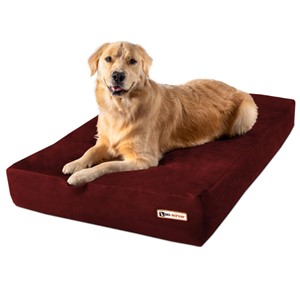
Big Barker XL Burgundy Orthopedic Rectangle Bed
Price At Time of Publish $130.00 $200.00
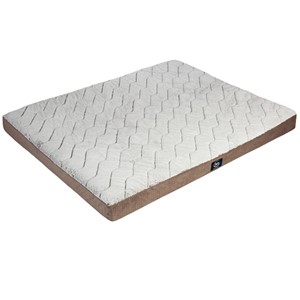
Serta XL Brown Orthopedic Rectangle Bed
Price At Time of Publish $130.00 $80.00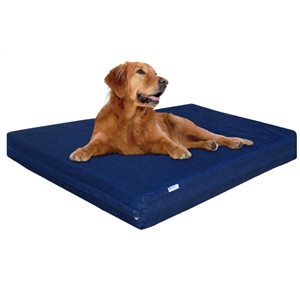
DogBed4Less XL Blue Orthopedic Rectangle Bed
Price At Time of Publish $130.00 $80.00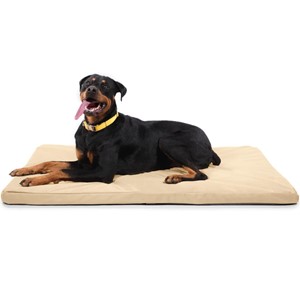
K9 Ballistics XL Sandstone Orthopedic Crate Pad
Price At Time of Publish $130.00 $159.00
Shop Bolster Dog Beds
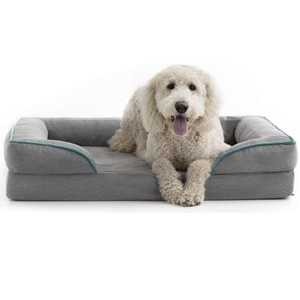
Brindle XL Gray Orthopedic Bolster Bed
Price At Time of Publish $130.00 $79.00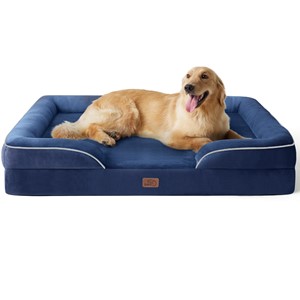
Bedsure XL Blue Orthopedic Bolster Bed
Price At Time of Publish $130.00 $76.00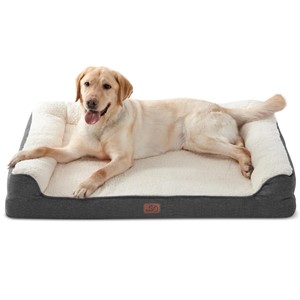
Bedsure XL Grey Orthopedic Bolster Bed
Price At Time of Publish $130.00 $60.00
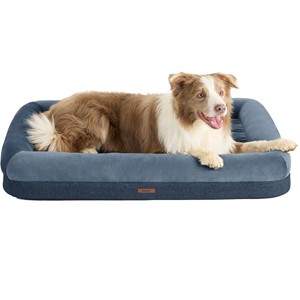
Lesure XL Navy Orthopedic Bolster Bed
Price At Time of Publish $130.00 $40.00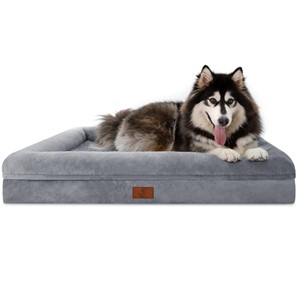
Yiruka XL Grey Orthopedic Bolster Bed
Price At Time of Publish $130.00 $55.00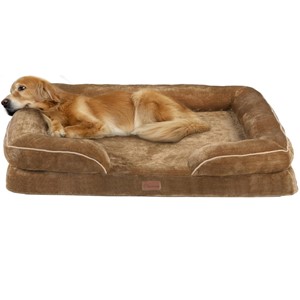
Yitahome XL Brown Orthopedic Bolster Bed
Price At Time of Publish $130.00 $37.00
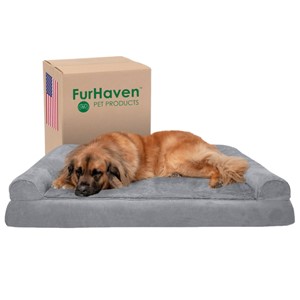
Furhaven XL Gray Orthopedic Bolster Bed
Price At Time of Publish $130.00 $130.00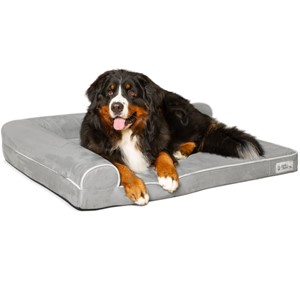
PetFusion XL Grey Orthopedic Bolster Bed
Price At Time of Publish $130.00 $60.00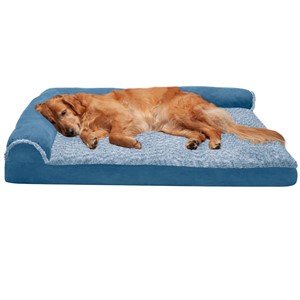
Furhaven Jumbo Blue Orthopedic Bolster Bed
Price At Time of Publish $130.00 $60.00
Shop Elevated Dog Beds
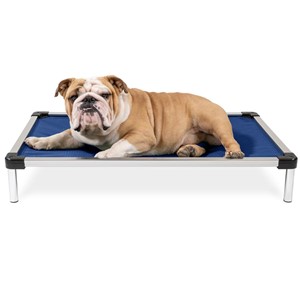
K9 Ballistics Chew Proof Elevated Small Bed
Price At Time of Publish $130.00 $129.00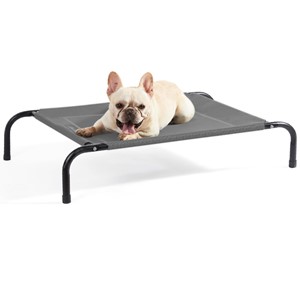
Bedsure Medium Elevated Dog Bed
Price At Time of Publish $130.00 $33.00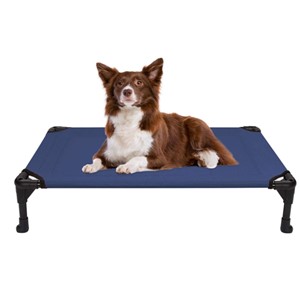
Veehoo Medium Elevated Dog Bed
Price At Time of Publish $130.00 $45.00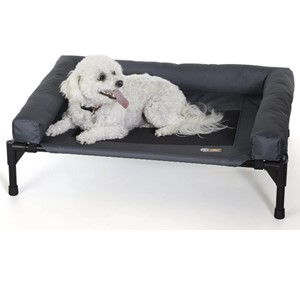
K&H Pet Products Elevated Bolster Dog Bed
Price At Time of Publish $130.00 $57.00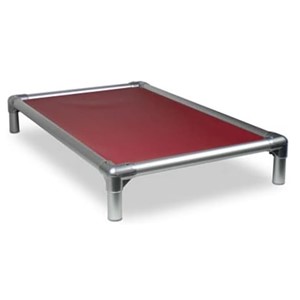
Kuranda Elevated Chew Proof Small Dog Bed
Price At Time of Publish $130.00 $134.00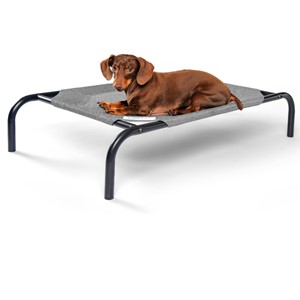
Coolaroo Small Elevated Dog Bed
Price At Time of Publish $130.00 $21.00
Related Articles
Below are some other articles you may be interested in reading. Just select on the topic of interest to learn more about it.
- Best Healthy Dog Food Brands
- Christmas Presents for My Dog
- Crates for Dogs
- Critical Signs Your Dog Needs Help
- Dog Training Techniques
- How To Train a Puppy
- Positive Reinforcement for Dog Training
- Puppy Proofing Your House
- Training Dog with Treats
- Using Alexa for Dog Behaviors
Go back to the Dog Luxury Beds home page.

